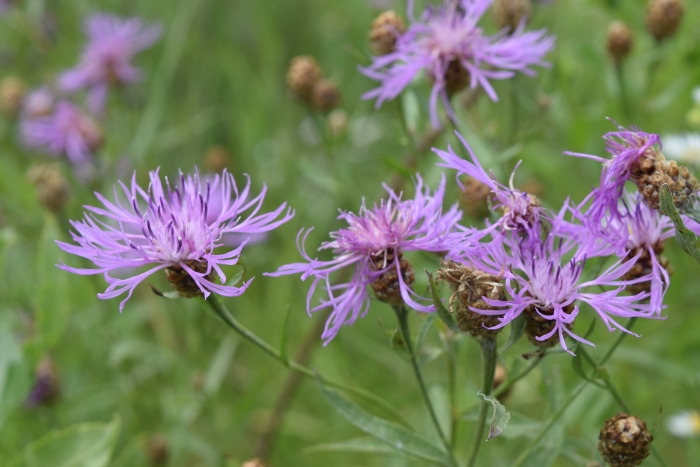Brown Knapweed
(Centaurea jacea)
Brown Knapweed (Centaurea jacea)
/
/

Natalya Ivanova
CC BY 4.0
Image By:
Natalya Ivanova
Recorded By:
Copyright:
CC BY 4.0
Copyright Notice:
Photo by: Natalya Ivanova | License Type: CC BY 4.0 | License URL: http://creativecommons.org/licenses/by/4.0/ | Rights Holder: Natalya Ivanova | Publisher: iNaturalist | Date Created: 2019-07-14T11:27:49-07:00 |













Estimated Native Range
Summary
Centaurea jacea, commonly known as brown knapweed or brownray knapweed, is a perennial herb native to a variety of habitats including dry meadows, grasslands, and open woodlands across Europe. It typically grows to a height of 4-31 inches (10-80 cm) and features a bushy clump of lance-shaped leaves. The flowers, which bloom from June to September, are composed of thistle-like purple to pinkish flower heads that are highly attractive to pollinators but not particularly showy by human standards.
Brown knapweed is valued for its hardiness and ability to thrive in poor soils, making it a useful plant for restoration projects and naturalistic plantings. It is also used in wildflower meadows and as a filler in perennial borders due to its extended flowering period. This species prefers full sun to partial shade and tolerates a range of soil types, provided they are well-drained. While it is drought-tolerant once established, it benefits from occasional watering during prolonged dry spells. There are no popular garden cultivars of significant note, and it is generally grown from seed or division. However, Centaurea jacea can become problematic if it escapes cultivation, as it is known to be invasive in some regions outside its native range, outcompeting native flora and altering ecosystems. Gardeners should be cautious and consult local regulations before planting.CC BY-SA 4.0
Brown knapweed is valued for its hardiness and ability to thrive in poor soils, making it a useful plant for restoration projects and naturalistic plantings. It is also used in wildflower meadows and as a filler in perennial borders due to its extended flowering period. This species prefers full sun to partial shade and tolerates a range of soil types, provided they are well-drained. While it is drought-tolerant once established, it benefits from occasional watering during prolonged dry spells. There are no popular garden cultivars of significant note, and it is generally grown from seed or division. However, Centaurea jacea can become problematic if it escapes cultivation, as it is known to be invasive in some regions outside its native range, outcompeting native flora and altering ecosystems. Gardeners should be cautious and consult local regulations before planting.CC BY-SA 4.0
Plant Description
- Plant Type: Herb
- Height: 2.5-3 feet
- Width: 2-2 feet
- Growth Rate: Moderate
- Flower Color: Pink, Purple
- Flowering Season: Summer, Fall
- Leaf Retention: Deciduous
Growth Requirements
- Sun: Full Sun
- Water: Low, Medium
- Drainage: Medium
Common Uses
Border Plant, Butterfly Garden, Low Maintenance
Natural Habitat
Native to dry meadows, grasslands, and open woodlands across Europe
Other Names
Common Names: Common Knapweed, Brown-Ray Knapweed
Scientific Names: , Centaurea jacea, Centaurea commutata, Centaurea jacea f. jacea, Centaurea jacea var. genuina, Centaurea jacea var. jacea, Centaurea jacea var. pinnatifida, Centaurea nemophila, Centaurea scopulicola, Centaurea variabilis
GBIF Accepted Name: